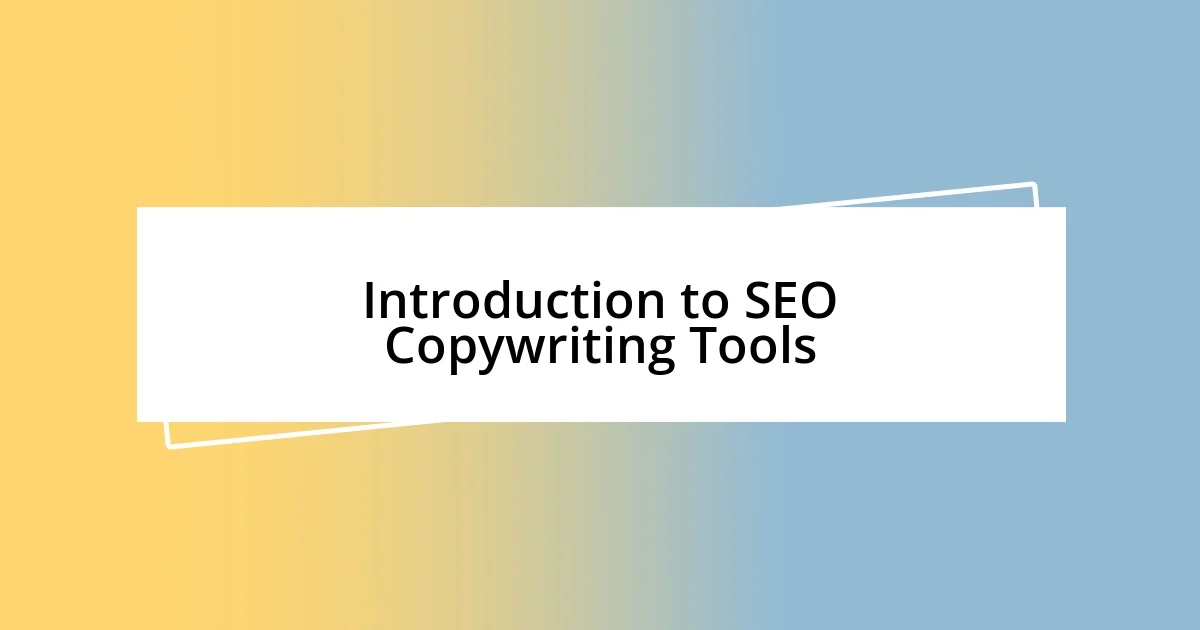Key takeaways:
- SEO copywriting tools enhance content optimization by providing essential features like keyword research, content analysis, and competitor insights, aiding in both creativity and strategic planning.
- Effective tools such as Ahrefs, SEMrush, and Clearscope offer actionable insights for keyword discovery, competitor analysis, and content refinement, significantly boosting engagement and performance.
- Readability tools like Hemingway Editor and ProWritingAid improve clarity and accessibility of content, ensuring it resonates with a broader audience while maintaining quality standards.

Introduction to SEO Copywriting Tools
SEO copywriting tools are essential for optimizing content to rank well on search engines while still engaging readers. I remember the first time I used a keyword research tool; it felt like discovering an entire new world of possibilities. How can you write effectively if you’re guessing what your audience is searching for?
These tools not only guide you in choosing the right keywords but also help in structuring your content for maximum impact. I often find myself curious: How can I strike the perfect balance between creativity and optimization? Using tools like readability analyzers can shed light on this balance, allowing me to craft content that resonates with readers while still meeting SEO standards.
Moreover, the analytics provided by these tools offer a glimpse into the content’s performance, helping me refine strategies over time. It’s fascinating to see how minor adjustments can significantly alter a piece’s reach. Have you ever felt that thrill when your hard work pays off? That’s the power of having the right tools in your SEO copywriting arsenal.

Essential Features for SEO Tools
When diving into the world of SEO tools, I learned that certain features truly make all the difference. For me, the best tools aren’t just about raw data; they provide actionable insights that can transform my writing process. I still vividly remember a project where I used an SEO tool that analyzed my competitors’ keywords—what an eye-opener that was! It was fascinating to see how similar phrases were performing and how I could tweak my own content to stand out.
Here are some essential features I look for in SEO tools:
- Keyword Research: Easily discover relevant keywords and their search volumes to inform content creation.
- Content Optimization: Tools that suggest improvements based on keyword density and readability scores.
- Competitor Analysis: Insights into what is working for others in your niche, allowing for strategic planning.
- Analytics and Reporting: Clear metrics on how your content is performing in real-time.
- User-Friendly Interface: A straightforward design that doesn’t overwhelm, making it easy to navigate data.
When I find a tool that checks all these boxes, I feel a sense of relief and excitement. It means I can focus more on my writing and less on guessing—there’s nothing worse than pouring my heart into an article only to have it go unnoticed. Tools that combine these features not only save time but also enhance creativity, enabling me to craft pieces that resonate and rank well.

Top Tools for Keyword Research
When it comes to keyword research, I have a few tools in my toolkit that I can’t live without. One of my favorites is Ahrefs. The first time I tried it, I was blown away by how many keyword suggestions I received and the clarity of their search volumes. It’s like having a cheat sheet that tells you exactly what your audience is looking for, which is invaluable when you’re trying to craft content that truly resonates. The more I use it, the more I see how important it is to choose the right keywords—not just for SEO, but also for reaching out to the right audience.
Another tool that truly stands out for me is SEMrush. I remember using it during a competitive analysis for a recent project. Being able to see which keywords my competitors were ranking for helped me identify gaps in my own content strategy. It’s not just about finding keywords; it’s about understanding the landscape and making informed decisions. The strategic insights I gained from SEMrush have sometimes led to content that significantly boosts engagement. I couldn’t believe the difference it made!
Finally, let’s talk about Ubersuggest. I first discovered this tool during a brainstorming session with a friend. We were searching for new blog ideas, and it delivered keyword insights that sparked discussions we hadn’t even considered. The simplicity and effectiveness of Ubersuggest in generating long-tail keyword suggestions have become an essential part of my research process. It keeps me inspired and focused on creating content that not only answers search queries but also engages readers on a deeper level.
| Tool | Key Feature |
|---|---|
| Ahrefs | Comprehensive keyword suggestions with search volumes |
| SEMrush | Competitor keyword analysis for strategic insights |
| Ubersuggest | Long-tail keyword suggestion for content inspiration |

Best Tools for Content Optimization
When it comes to content optimization, I always turn to tools like Surfer SEO. I still recall the first time I used it; I was hesitant, thinking it might complicate my writing process. Instead, it provided me with practical guidelines on formatting and keyword density that not only made my articles more optimized but also kept my writing flow intact. Isn’t it amazing how a tool can enhance creativity by simply offering structured suggestions?
Another standout tool for me is Clearscope. I had a project where I needed to refine my existing content, and Clearscope made it incredibly easy. By analyzing top-performing articles, it taught me how to integrate relevant keywords seamlessly while maintaining clarity and readability. It felt like having a knowledgeable friend nudging me in the right direction, ensuring every word counted. Have you ever experienced that moment when insights click and your writing suddenly becomes stronger?
Finally, I cannot overlook the value of Grammarly in my optimization toolkit. Initially, I saw it purely as a grammar checker, but it has evolved into so much more. I remember editing a crucial post right before the deadline. Grammarly suggested improving tone and clarity, which made the final product resonate with my audience. It reinforced the idea that optimization isn’t just about keywords; it’s about crafting an engaging and error-free narrative. How often do we underestimate the power of clear communication in connecting with our readers?

Effective Tools for Competitor Analysis
I have a couple of go-to tools for competitor analysis that have really transformed how I approach my SEO strategy. One that really stands out is SpyFu. I can still remember the excitement I felt when I first uncovered the keywords my competitors were bidding on for their ads. It was like getting a sneak peek into their marketing playbook! By understanding their PPC strategies, I could refine my own campaigns and discover new opportunities that I hadn’t considered before.
Another tool that I find invaluable is SimilarWeb. I can vividly recall the day I compared my site’s traffic with that of a competitor’s. The depth of insights it provided—from traffic sources to audience demographics—was astonishing. This information allowed me to tailor my content to better meet the needs of my target audience, something that truly enhanced my overall strategy. Have you ever looked at your competition and thought about how to leverage their strengths for your own gain?
Finally, I’ve found great value in using Majestic for backlink analysis. I remember the first time I analyzed my competitor’s backlink profile. I was amazed at how insights from their links could inform my outreach efforts. It’s not just about gathering backlinks; it’s about understanding the relationships and networks that can elevate your content’s authority. This tool has truly shown me the importance of strategic link-building, enhancing not just my SEO, but also the credibility of my brand. How often do we consider the connections we can foster beyond just our immediate goals?

Must-Have Tools for Readability
When it comes to ensuring readability, tools like Hemingway Editor consistently impress me. The first time I used it, I was astonished by how it highlighted lengthy sentences and offered simpler alternatives. It felt like having an editorial guardian guiding me to write more concisely. I often ask myself, how many readers struggle with dense text that could have been clearer?
Another indispensable tool for readability is Readable. I remember running a particularly technical article through it, expecting a harsh critique. Instead, it helped me identify overly complex phrases and jargon that didn’t need to be there. Seeing those readability scores make me realize how important it is to cater to our audience’s understanding. Have you ever considered how slight adjustments can make your content accessible to a broader audience?
Lastly, I cannot stress enough the impact that ProWritingAid has had on my writing. It does so much more than just check grammar; it offers insights into style and flow that often go unnoticed. I recall a time when I was stuck on a particularly fluffy paragraph, and ProWritingAid’s suggestions encouraged me to trim the excess. It’s incredible how tools like these can transform our writing into something that truly resonates with readers. Isn’t it fascinating how a little clarity can lead to deeper engagement?

Final Thoughts on SEO Tools
When I reflect on the myriad SEO tools available today, it’s clear that they can make a world of difference in our writing strategies. For instance, I vividly remember a project where I relied heavily on Google Analytics. The thrill of discovering which of my articles attracted the most organic traffic was invigorating and pushed me to dive further into some successful techniques. Isn’t it interesting how data can inspire creativity in our writing?
Another aspect that strikes me about SEO tools is their ability to demystify the often complex world of search algorithms. When I first started using SEMrush, the comprehensive keyword tracking and domain audits opened my eyes to the nuances of SEO optimization. I felt a rush of empowerment every time I watched my keyword ranking improve. Wouldn’t you agree that understanding these metrics can help us not only refine our current content but also shape future projects?
Moreover, collaboration tools like Trello can simplify the entire content process. I recall a time when managing multiple projects felt overwhelming, but creating boards for each campaign helped my team and me stay organized and efficient. I often wonder how much smoother our writing journey could be with a little organization. It’s an exciting reminder that the right tools can transform not only our approach to SEO but also our overall productivity.














